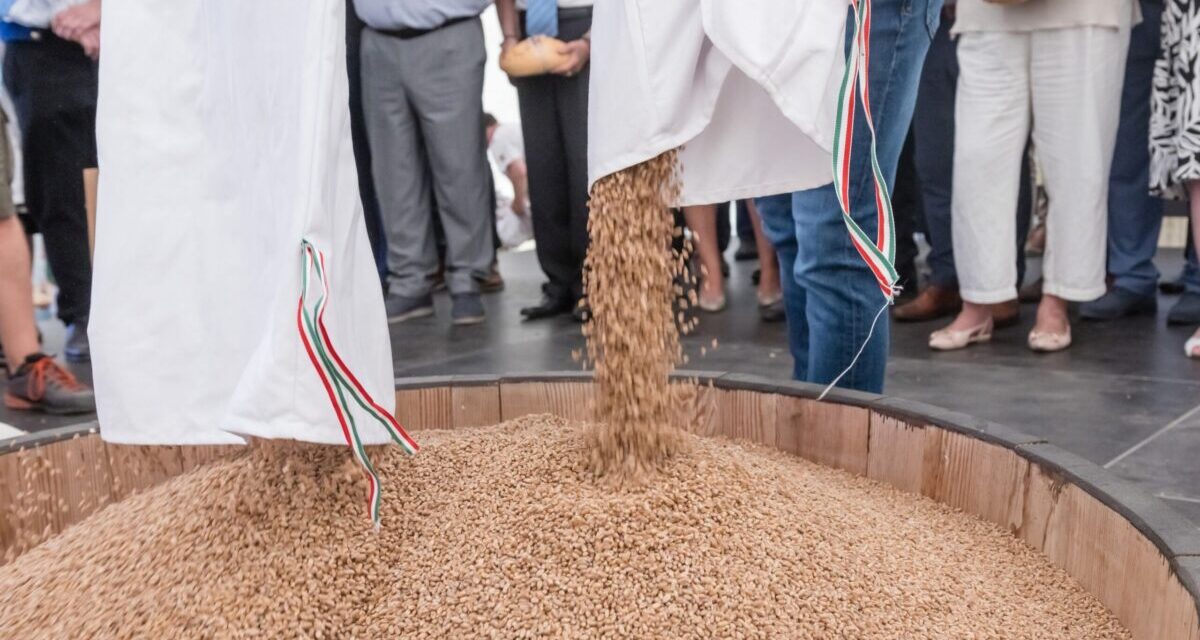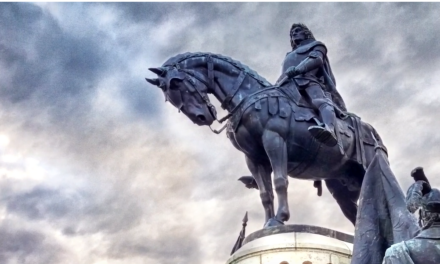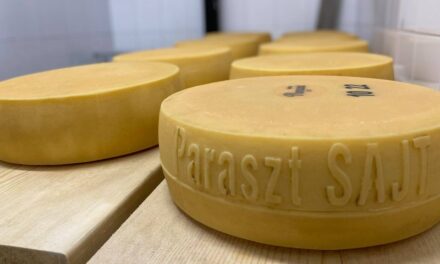The celebration of the 15 million grains of wheat program in the Carpathian Basin was celebrated.
Hungary still needs strong agriculture in the 21st century, and it needs everything that settlements and villages have played in the life of the nation and are still playing today, said the minister who heads the Prime Minister's Office in Somogyvár on Thursday.
Gergely Gulyás pointed out at the celebration of the integration of wheat in the Carpathian Basin of the Bread of the Hungarians - 15 million grains of wheat program that agriculture accounts for more than 5 percent of the total domestic product, and that the preservation, growth, and long-term future of the countryside still depends primarily on agriculture in Hungary.
Hungary is one of those countries that is able to provide food not only for itself, but also for the whole of Hungary, this shows how strong and how valuable its agriculture is despite all the difficulties - said the audience gathered at the Szent László National Memorial, at the ruins of the Szent Egyed Benedictine Abbey before.
He emphasized, "we see that much more threatens peace and security today than a few years or decades ago, in such situations what we can produce is especially valued," he said.
Gergely Gulyás therefore called the wheat produced in Hungary a unique value, and pointed out that farming cannot be done in the short term, cultivating the land requires decades of time.
Therefore, one of the biggest and most important questions of the Hungarian present and future is whether there will be a new generation of farmers, whether there will be those who will take the place of those who now carry agriculture on their shoulders and who will take on the mission of maintaining the countryside and preserving the nation, he said.
Minister of Agriculture István Nagy emphasized that the wheat harvest festival is about unity, togetherness, loyalty, respect for culture and historical traditions, and about the values that make a nation strong.
The head of the ministry expressed his gratitude to the participants of the Magyarok Kenyere program, including the farmers of the Carpathian Basin who offered wheat, the Association of Hungarian Farmers' Cooperatives and Farmers' Cooperatives who took part in the organization and collection, the National Chamber of Agriculture, the Magyarok Kenyere Alapítvány, the NAK Magyarok Kenyere Nonprofit Közhhasznú Kft. , the employees of foreign farmers' organizations, the village farmers of the Carpathian Basin.
Bread always and everywhere carries the message of safety, future and survival. However, for us Hungarians, it is a self-evident metaphor of life. Hungarians' bread is also guaranteed this year, István Nagy declared.
"The program is an example of cooperation, solidarity, support of the needy, it contains everything that lives in the heart of Hungarians: faith, love of our culture, respect for traditions, selfless willingness to help, a lot of goodwill, and year after year it says, no we are alone, we can count on each other," said István Nagy.
He stated about this year's harvest in Hungary: the wheat needed for "our daily bread" has been grown, successfully harvested and is safely available.
István Jakab, the vice-president of the Parliament and the president of Magosz, expressed the opinion that the bread of the Hungarians is not a program, but "the real Hungarian feeling of life", that they can count on each other. They can show that they are together, they can live the experience of togetherness, they can share their knowledge and the information that helps them.
"This program gives faith and strength, and whatever difficulties there are, no matter how much they try to manipulate us here in the Carpathian basin, we persevered, we persevere," said István Jakab, noting that he believes they can also set an example of unity and togetherness for the peoples of Europe.
Balázs Győrffy, President of the National Chamber of Agrarian Economy, member of the European Parliament, recalled that 10 years ago, the chamber joined the Hungarian Bread program, which started 14 years ago, and which, from the initial good idea and promising initiative, has now become one of, or perhaps the most significant, all-Hungarian movement, the the amount of wheat collected increased from 10 tons to a thousand tons.
He pointed out that with the collected grain, they help fellow citizens in need, residents of children's homes, homes for the elderly, families with many children, and war victims.
Csaba Borboly, the chairman of the county council of the RMDSZ, emphasized that wheat, as a symbol of life, connects us, and through the Hungarian Bread program, we not only pay tribute to the work of farmers and the value of the harvest, but also celebrate the strength of the community, the strength that there is a growing need.
In Europe, the power is still in the hands of pro-migration and pro-war forces, and they want to crush our resistance while they still have the strength, he said.
According to her words, it seems as if Hungary and the Hungarian people are under siege, but she has to hold on until the air runs out around the political forces that support migration, gender madness and war.
Attila József Móring (KDNP), the region's parliamentary representative, pointed out in his speech that the location of the wheat threshing festival is symbolic: the accommodation of leader Koppány was nearby, and King Saint László had a Benedictine abbey and church built here.
Zoltán Madarász, the president of NAK and Magosz in Somogy, drew attention to the fact that "the peasant knows what his job is, he plows, sows and harvests every year so that the nation has bread".
"Unfortunately, we live in times when our politicians, especially in Western Europe, do not know this simple idea, which even the last Hungarian peasant knows, that we need wheat, we need bread, we need life and we need peace," he added.
Tímea Antal, the president of the Hungarian Heritage Foundation of Southern California, said that for those living in the diaspora, holidays are those occasions that serve to protect and preserve the Hungarian word.
"Our mother tongue carries our culture, our soul is manifested in our culture, the task of all of us in the diaspora is to strengthen our national identity, nurture our traditions, and arouse interest in getting to know our roots more deeply," he said.
MTI
Cover image: The merged wheat is the Bread of the Magyars - 15 million grains of wheat program at the Carpathian Basin Wheat Merger Festival in Somogyvár, at the Szent László National Memorial on August 8, 2024.
Source: MTI/Tibor Katona













